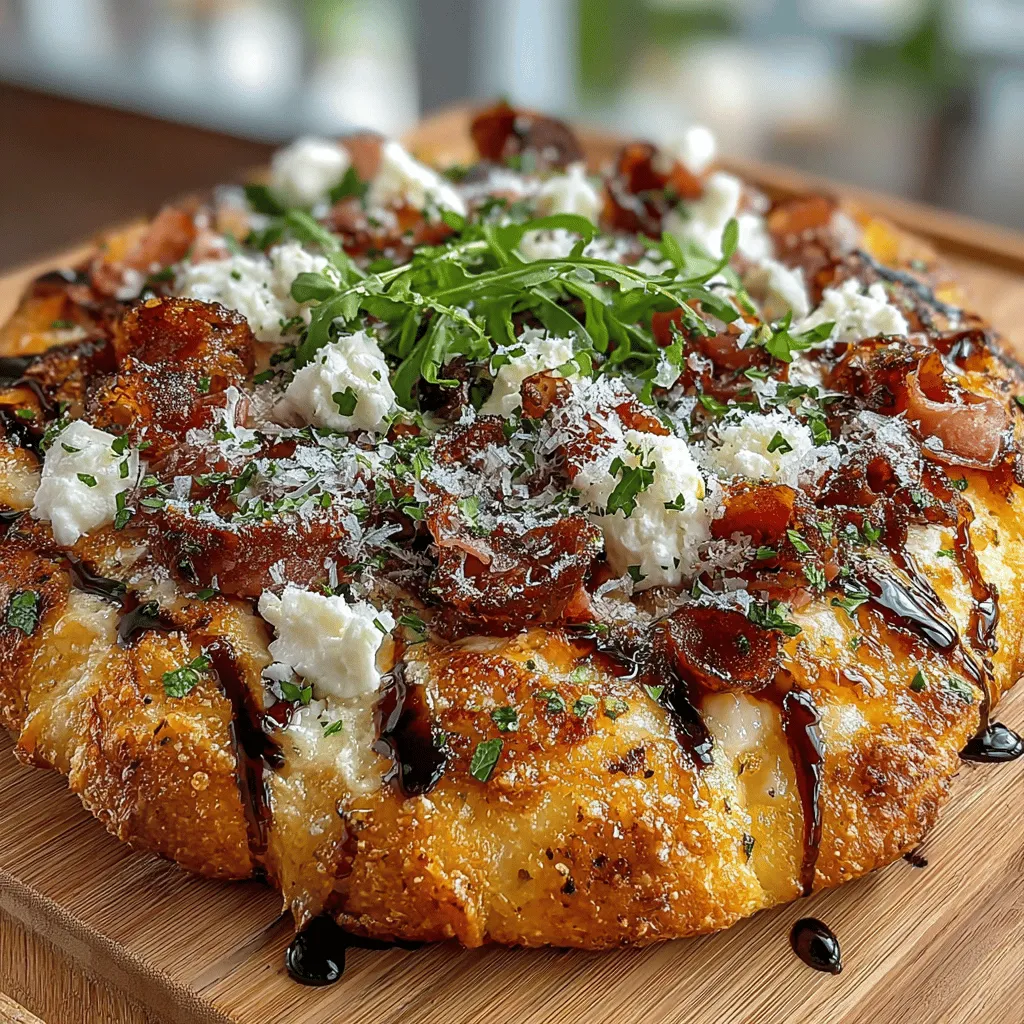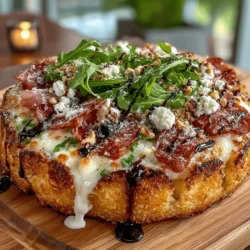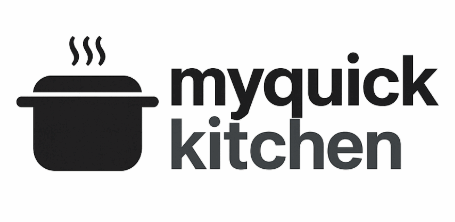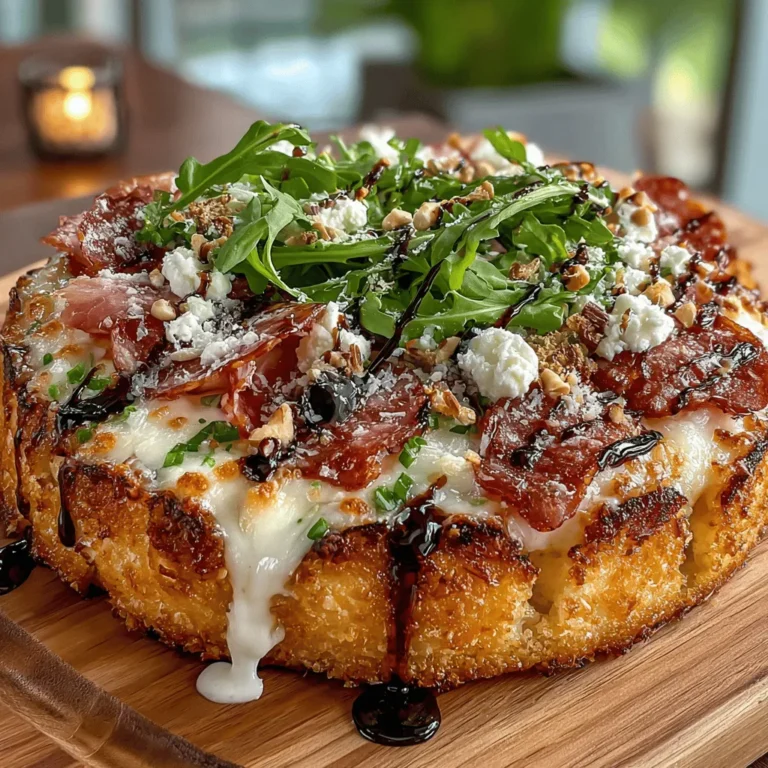Charcuterie Board Pizza: A Gourmet Twist on a Classic Favorite
In the world of culinary creativity, few dishes have captured the imagination like the Charcuterie Board Pizza. This innovative recipe artfully combines the familiar flavors of traditional pizza with the sophisticated variety found on a charcuterie board. It’s a harmonious blend that elevates a simple pizza into a gourmet experience, making it an ideal centerpiece for gatherings, parties, or cozy family dinners. As unique pizza recipes continue to gain popularity, the Charcuterie Board Pizza stands out, appealing to both pizza lovers and charcuterie enthusiasts alike.
The charm of this dish lies not only in its deliciousness but also in its visually stunning presentation. Imagine a perfectly baked crust topped with a vibrant array of meats, cheeses, fruits, and nuts, all harmoniously arranged to create a feast for the eyes and the palate. Whether you’re hosting a game night, celebrating a birthday, or simply enjoying a night in, this pizza is sure to impress your guests and elevate your dining experience.
The Origins of Charcuterie Boards
To appreciate the Charcuterie Board Pizza fully, it’s essential to understand the origins of charcuterie boards themselves. The concept dates back centuries to France, where charcuterie referred to the art of preparing and serving cured meats. Over time, this practice evolved to include a variety of accompaniments such as cheeses, pickles, fruits, and nuts, creating a beautiful spread that celebrates diverse flavors and textures.
Incorporating elements of a charcuterie board into a pizza not only pays homage to this rich culinary tradition but also opens the door to endless possibilities for flavor combinations. The key is to balance the savory, creamy, tangy, and sweet components, creating a pizza that is as complex as it is delicious.
The Allure of Charcuterie Board Pizza
What makes the Charcuterie Board Pizza truly special is its versatility. You can customize it to suit any occasion or personal taste. Whether you prefer a classic Italian flair with fresh basil and mozzarella or a more adventurous blend of international flavors, the options are virtually limitless. This pizza allows for creativity and experimentation, making it a fun cooking project for both novice and experienced chefs.
Moreover, the Charcuterie Board Pizza serves as a conversation starter at any gathering. Guests can be involved in the process of creating their personalized slices, selecting from an array of toppings, and sharing in the experience of assembling a meal together. It’s an interactive dining option that fosters connection and enjoyment, making every bite even more satisfying.
Ingredients Breakdown
To create a mouthwatering Charcuterie Board Pizza, it’s essential to select high-quality ingredients that enhance the overall flavor profile of the dish. Below is a detailed overview of the key components that make this pizza a standout.
Pizza Dough
First and foremost is the pizza dough, the foundation of any great pizza. You have the option of using store-bought dough for convenience or making your own from scratch for a more personalized touch. If you choose to make your own, consider a simple recipe using flour, yeast, water, and salt. Allow the dough to rise properly to achieve that perfect fluffy texture. For those short on time, many grocery stores offer fresh or frozen dough that can save you the hassle while still delivering great taste.
Sauce
Next up is the sauce. While traditional marinara can certainly work, a good sauce can significantly enhance the flavor of the pizza. For the Charcuterie Board Pizza, consider using a balsamic glaze. This rich, tangy sauce adds depth and sweetness, perfectly complementing the savory ingredients that follow. The balsamic glaze not only enhances the overall flavor but also adds a glossy finish to the pizza, making it even more visually appealing.
Cheese Selection
Cheese is another crucial element of the Charcuterie Board Pizza. A combination of cheeses will provide a range of flavors and textures, ensuring each bite is delightful. Classic mozzarella serves as an excellent base, providing that gooey, melty goodness we all crave. Goat cheese adds a tangy creaminess that contrasts beautifully with the other ingredients, while freshly grated Parmesan contributes a salty, nutty flavor that ties everything together. The interplay of these cheeses creates a rich and satisfying pizza experience.
Meats
Finally, the choice of meats is what truly elevates this pizza to charcuterie status. Consider incorporating a variety of cured meats, such as prosciutto, salami, and chorizo. Prosciutto brings its delicate, salty flavor, while salami adds a robust, peppery bite. Chorizo contributes a smoky, spicy kick that can take the flavor profile to another level. This combination of meats not only enhances the taste but also adds a delightful textural contrast to the pizza.
As you gather your ingredients, keep in mind that the beauty of the Charcuterie Board Pizza lies in its customization. Feel free to add seasonal fruits like figs or pears, fresh herbs like basil or rosemary, and even nuts for an added crunch. Each ingredient plays a role in creating a well-rounded dish that is both satisfying and memorable.
—
This introduction sets the stage for an exciting culinary journey into the world of Charcuterie Board Pizza. With its rich history and endless possibilities for customization, this dish is sure to become a favorite in any home. In the following sections, we will delve deeper into the preparation process and share tips to ensure your Charcuterie Board Pizza turns out perfectly every time.

When it comes to creating a culinary experience that combines the best of charcuterie with the beloved flavor of pizza, the Charcuterie Board Pizza stands out as a unique and delightful dish. This pizza not only serves as a feast for the eyes but also tantalizes the taste buds with its mix of savory meats, rich cheeses, and flavorful extras. In this section, we will explore the essential ingredients, provide detailed step-by-step instructions for preparing the pizza, and offer serving suggestions that will enhance your dining experience.
Fruits and Extras
One of the standout features of the Charcuterie Board Pizza is the inclusion of fruits and extras that balance the savory components of the dish. Ingredients like olives, nuts, and seasonal fruits such as figs and pears introduce a delightful contrast to the rich flavors of cheese and cured meats.
– Olives: These salty morsels provide a briny punch that can elevate the flavors of the pizza. Green or black olives, depending on your preference, can be sliced and scattered across the pie, adding both flavor and texture.
– Nuts: Nuts such as walnuts or pistachios can be chopped and sprinkled on top for a satisfying crunch. They add a nutty flavor that harmonizes beautifully with the savory elements.
– Fruits: Fresh figs or slices of pear can be used to add a touch of sweetness. Their natural sugars caramelize slightly during baking, enhancing their flavors and providing a lovely contrast to the salty meats and cheeses.
The combination of these ingredients creates a well-rounded taste profile that ensures every bite is a delightful surprise.
Step-by-Step Instructions
Preheating and Preparing
To achieve the perfect Charcuterie Board Pizza, start by preheating your oven. Set it to 475°F (245°C), allowing enough time for the oven to reach the desired temperature, which is crucial for a crispy crust. While the oven is preheating, prepare your pizza dough. You can use store-bought dough or make your own from scratch. If using store-bought, allow it to come to room temperature for about 30 minutes, which will make stretching it out easier.
Layering the Ingredients
1. Roll Out the Dough: On a lightly floured surface, roll out your pizza dough into your desired shape—whether it’s round, square, or rectangular. Aim for a thickness of about ¼ inch for a crispy crust with a chewy interior.
2. Spread the Sauce: Transfer the rolled-out dough onto a pizza stone or baking sheet lined with parchment paper. Using a spoon or a spatula, evenly spread a generous layer of your choice of sauce (tomato, pesto, or olive oil) across the dough, leaving about a half-inch border around the edges.
3. Add the Cheese: Next, sprinkle a layer of shredded mozzarella cheese over the sauce. Mozzarella provides that classic pizza stretch and melt. Consider adding other cheeses like creamy goat cheese or sharp cheddar for additional flavor.
4. Layer the Meats: Now it’s time to layer on the meats. Choose a mix of your favorites from the charcuterie board—salami, prosciutto, and pepperoni are excellent choices. Arrange them evenly over the cheese, ensuring every bite has a bit of meat.
5. Scatter the Extras: Finally, scatter your chosen extras, which may include olives, chopped nuts, and fruits. This is where you can get creative—feel free to experiment with different combinations and quantities to suit your taste.
Baking the Pizza
Once fully assembled, transfer your pizza to the preheated oven. Bake it for 12-15 minutes, or until the crust is golden brown and the cheese is bubbly and slightly browned. Keep an eye on the pizza as it bakes; every oven is different, and you may need to adjust the time slightly.
To achieve the perfect crust, consider using a pizza stone, which helps to evenly distribute heat. If you’re using a baking sheet, preheat it in the oven before placing the pizza on it. This method can help you achieve a crispier base.
Garnishing and Serving
Once your Charcuterie Board Pizza is out of the oven, let it cool for a minute or two. This resting period allows the cheese to set slightly, making it easier to slice. For an added touch, drizzle a bit of high-quality olive oil or balsamic glaze over the top, or sprinkle fresh herbs like basil or arugula for a pop of color and flavor.
Using a sharp pizza cutter, slice the pizza into wedges or squares, depending on your preference. Serve it warm, either on a wooden board for a rustic presentation or on individual plates for a more formal setting. Pair your pizza with a simple side salad or some roasted vegetables to round out the meal.
Serving Suggestions and Pairing Ideas
The Charcuterie Board Pizza is versatile and can be served in various settings, from casual family dinners to elegant gatherings. Here are some serving suggestions and pairing ideas to enhance your dining experience:
– Side Dishes: Complement your pizza with a fresh arugula salad dressed in a lemon vinaigrette. The peppery notes of arugula will contrast nicely with the rich flavors of the pizza. Alternatively, serve a charcuterie board alongside with assorted cheeses, cured meats, olives, and nuts to echo the ingredients in the pizza.
– Drinks: Pair your pizza with a light-bodied red wine like Pinot Noir, which harmonizes well with the savory elements. For a non-alcoholic option, consider sparkling water with a slice of lemon or a refreshing iced tea.
– Presentation: Serve the pizza as part of a larger meal, perhaps alongside a selection of other gourmet pizzas or appetizers. This allows guests to sample different flavors and creates an inviting spread.
Conclusion
The Charcuterie Board Pizza is a delightful fusion of flavors that brings together the best aspects of traditional charcuterie and pizza. Its versatility allows for countless variations, making it an excellent choice for any occasion. Whether you’re entertaining guests or enjoying a cozy night in, this pizza will surely impress.
Encourage your creativity by experimenting with different meats, cheeses, and toppings, tailoring the pizza to reflect your personal tastes. The joy of making your own Charcuterie Board Pizza lies in customizing it to your heart’s content and enjoying the process. So gather your ingredients, invite some friends, and embark on a delicious culinary adventure that is as fun to make as it is to eat.


